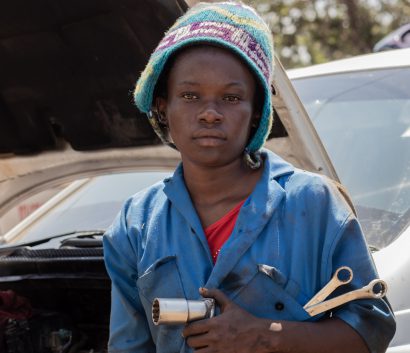Preventing Gender-based Violence through Economic Opportunity

Yorub completed CDC’s DREAMS employability training in Kenya and was linked to a youth job placement agency. She is currently among the best performing customer service staff at Kenya’s largest shopping complex. Yorub is one young woman profiled in “Our Lens Sauti Zetu (Our Voices)," a PEPFAR Kenya photobook created by DREAMS girls highlighting their own stories. Source: Together for Girls
Adolescent girls and young women (AGYW) in sub-Saharan Africa are 14 times more likely to be HIV positive than boys and young men in their same age group.[1] CDC, as part of the U.S. President’s Emergency Plan for AIDS Relief (PEPFAR), launched the Determined, Resilient, Empowered, AIDS-free, Mentored and Safe (DREAMS) initiative to reach AGYW and reduce their vulnerability to HIV infection. The DREAMS initiative is implemented by CDC partners, in collaboration with local governments, and delivers a core package of layered evidence-based interventions that target multiple vulnerabilities to HIV infection for AGYW. DREAMS interventions address not only social, cultural, behavioral, and biomedical risk factors for HIV but also address economic factors to reduce AGYW’s reliance on transactional sex and strengthen their self-efficacy and decision-making power in relationships.
The links between economic insecurity and gender-based violence (GBV) are complex and operate at an individual, interpersonal and societal level. Those who live in chronic poverty may find themselves more likely to experience acute stress and resort to risky coping strategies that increase the risk of violence; for example, an adolescent girl may exchange sex for material resources to meet her basic needs. In addition, financially insecure individuals may also live in locations that are prone to conflict, have fewer support services, and offer weaker legal protections for the most vulnerable.
DREAMS: Comprehensive program for economic strengthening
Because poverty can be a driver for GBV, interventions are needed to increase economic security. DREAMS offers comprehensive programs to strengthen the economic and financial wellbeing of vulnerable AGYW. These programs include the following key components:
- Training in financial literacy and skill development
- A bridge to employment through either wage employment (e.g., paid internships or jobs) or self-employment/entrepreneurship (e.g., starter packs or other support for small businesses)
- Ongoing mentorship
- Savings groups
- Social and business networks
The goal of these programs is to support comprehensive workforce development to create and sustain opportunities for AGYW in the workforce and promote future businesses and industry.
Economic strengthening programs in action

Sheila completed a course in Mechanical and Motor Vehicle Engineering and works as a mechanic at a local garage located in Kisumu, Kenya. She makes enough money to support her sick mother and younger siblings and plans to return to school. Sheila is one young woman profiled in “Our Lens Sauti Zetu (Our Voices)," a PEPFAR Kenya photobook created by DREAMS girls highlighting their own stories. Source: Together for Girls
In Tanzania, the CDC implementing partner, ICAP at Columbia University, offers economic strengthening opportunities through the WORTH+ program. The program empowers AGYW with the knowledge and skills needed to develop business ideas, transform them into lucrative businesses, and start and maintain their businesses while saving for future expansion. One participant in the program was selling sardines at the market and was unable to save any of her money prior to joining DREAMS. As part of DREAMS, she was able to get a loan to expand her business and earn more income. Being empowered economically has also helped her to protect herself from engaging in high-risk sexual behaviors to supplement her income. She shared her experience with DREAMS. “Now because of my business improvement, I have been able to repay the loan from our group, support my parents on some household needs, and buy my own stuff,” she said. “I have realized the risks I was putting myself into before DREAMS, and I am now very careful of the decisions I make concerning my health and sexual relationships. From now on, my life is no longer at risk as it used to be before I joined the program. DREAMS changed my life!” [2]
“From now on, my life is no longer at risk as it used to be before I joined the program. DREAMS changed my life!”
— Tatu, DREAMS participant in Tanzania
In Uganda, through PEPFAR support, the Rakai Health Sciences Program (RHSP) runs multiple comprehensive economic strengthening programs including providing training on entrepreneurship and providing starter kits for AGYW to start their own business. In addition, they facilitate savings groups for participants to save and invest their profits. One participant in Uganda, Doreen, was provided maize seed for a farming project. Additionally, after she completed the DREAMS program, she was hired to facilitate DREAMS parenting training. With the profits from her DREAMS work as well as her farming activities, she was able to save enough funds to open a small retail shop, expand her investment in agriculture and purchase two plots of land. Watch a short video about Doreen’s story. Visit RHSP’s website to learn more about DREAMS in Uganda and watch other videos about the impact the economic strengthening programs have had on the lives of AGYW in Uganda.
DREAMS programming has helped AGYW to find and retain wage employment, manage their businesses and generate enough income to cover their personal daily needs while helping to support their families. By providing AGYW with access to capital, markets, training, technical assistance and networking opportunities, DREAMS is building a safer, healthier and more economically stable future for AGYW and their communities.
- ‘Champions for Change’ Initiative in Kenya Brings Together Community to Speak Out Against Gender-based Violence
- CDC Training Helps Healthcare Providers Respond to Gender-Based Violence
- Decreasing violence, stigma, and discrimination among female sex workers in Kenya
- Preventing Gender-based Violence through Economic Opportunity